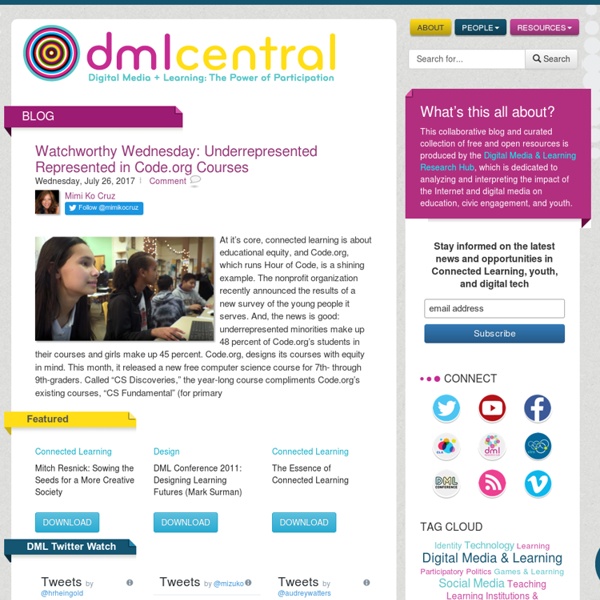



My Best of series You can find all of my “Best” lists in broad categories here. The link to that page can also be found at the top right of my blog: My Best Of Series I also have them all on another page where they are listed in the chronological order in which I originally posted them. 3 Principles for great online courses I love teaching. It’s all about that “ah-ha” moment someone gets. You see their eyes light up as the revelation sweeps over them. At Learndot we build tools to create those moments. Virtual Reality Simulation E-Learning by Skills2Learn Training your workforce or students today can pose a number of challenges. Cost expenses, equipment shortages, dangerous situations, people’s motivation to learn are all factors hindering good training. Fail to motivate learners? Leave learners confused and lacking confidence? Test competency? Deal with customer issues?
William Annin Middle School Who are you, what is your role and what class(es) do you teach Steven Isaccs, Teacher of 8th grade Video Game Design and Development. What versions of GameMaker do you use? Social Media in Higher Education “Social Media Manager” was recently named one of the Best New Jobs in America, according to CNN. Looking ahead to 2013, social media is set to become a required skill-set, as demand for professionals experienced with social media continues to rise. Social media is gaining adoption company-wide, and currently there are over 13,000 job postings per month requiring social media skills. To meet this growing demand for social media experts in the workforce, HootSuite has created a Higher Education Program.
The Internet will not ruin college I barged into my son’s room on Wednesday afternoon to ask him when he wanted dinner, and discovered him watching a Khan Academy video to help with his chemistry homework. And I thought: that story I’ve been working on about the backlash against MOOCs (Massive Online Open Courses)? Why am I even bothering? The war is already over. Debating the value of online education at the current moment in history makes about as much sense as questioning the tactics of the losing Roman generals in the great third century B.C. battle of Cannae. Perhaps of some interest to academics, but moot.
Ask3 for iPad: Put an end to homework confusion! The second students walk out of a classroom they often leave behind their ability to collaborate and problem-solve. Many are unable to get help at home and have to wait to ask questions until the next time they’re in class. Ask3, our new iPad app, aims to solve this problem. Online Learning Pathways Conventional e-learning relies on the SCORM module (sometimes called the SCO – ‘shareable content object’ by those in the business). The SCORM module is a good concept – effectively an online learning activity that includes interactions and assessment that can be delivered via any SCORM compatible LMS (effectively all LMS’). But there are some serious limitations to SCORM so are there other ways to develop e-learning or online learning that don’t require the use of SCORM?
Mobile Learning Support for New Teachers The mobile learning revolution is alive and growing in popularity every day. When schools move toward mobile learning in the classroom, they can take advantage of electronic devices such as tablets and cell phones that offer portability and ease of use. Mobile learning technologies can offer teachers a flexible approach to learning with their students in a variety of locations, and encourage this learning to continue at home. As schools begin to consider the movement towards mobile learning, it’s important to support teachers with strategies for success, particularly if they are new. As I began to research this topic I was disappointed to discover that resources for supporting new teacher use of mobile learning strategies weren’t easily accessible.
JOLT - Journal of Online Learning and Teaching Introduction Universities world-wide, backed by a thriving communication and information technology industry and an invigorated field of research in instructional design and technology (Reiser & Dempsey, 2007), currently have at their disposal a technological array of options that completely dwarf earlier means to provide students with distance education (Bates, 2005; McGreal & Elliott, 2008). However, initiatives undertaken by universities, namely in North America, to launch stand-alone, asynchronously-based Web courses (Boettcher & Conrad, 2004), are meeting with mixed results, from a promise of going mainstream (Allen & Seaman, 2004) to a realization of expectations not being met (Larreamendy-Joerns & Leinhardt, 2006; Zemsky & Massy, 2004).
Google's 80/20 Principle Applies to Students The 80/20 principle that Google practices has trickled down to students in classrooms across North America. For at least 20 percent of their week, students work on projects that interest them. Whether educators call it 20 percent time or genius hour, the concept is the same, said Gallit Zvi, a teacher at Georges Vanier Elementary in British Columbia's Surrey School District 36. "The goal as I see it is to give students time to explore what they wonder about or what their passions are," Zvi said. "They're in charge of their learning rather than me being the curriculum deliverer standing up in front of the class saying, 'This is what we need to learn."
Slow Learning: Living with a Sage at Your Side A number of years ago, I wrote an article (PDF) talking about how we might go beyond our current ‘apart’ learning experiences. The notion is what I call ‘layered learning’, where we don’t send you away from your life to go attend a learning event, but instead layer it around the events in your life. This is very much part of what I’ve been calling slow learning, and a recent conversation has catalyzed and crystalized that thought.